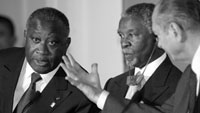
PARIS (PANA)–South African President Thabo Mbeki said in Paris recently that an extraordinary summit of the African Union (AU) would be held “in a week’s time” to consider the continental body’s support for Cote d’Ivoire.
Addressing a news conference at the end of an African summit on the Ivorian crisis in the French capital, the current AU chairman stressed the need to move fast to bolster the peace agreement recently reached by Ivorian political parties and rebel groups.
Pres. Mbeki said the AU’s support is expected to reinforce other pledges made in Paris by UN Secretary General Kofi Annan and European Union Commission President Romano Prodi to help cement Cote d’Ivoire’s peace and stability.
The South African President stressed the need to move fast in efforts to support the peace process in Cote d’Ivoire in order to save lives.
Pres. Mbeki welcomed the efforts made by France and the Economic Community of West African States (ECOWAS) to find a lasting solution to the four month Ivorian crisis. He dismissed suggestions that through its weakness, the AU had allowed France to “hijack” the initiative to solve an African conflict.
While the AU had agreed that ECOWAS should spearhead efforts to identify a lasting solution to the crisis, it was also involved in supporting these efforts, Pres. Mbeki said. He added that as AU chairman, he was also in constant telephone contact with French President Jacques Chirac on the initiatives being taken to resolve the Ivorian conflict.
“We are pleased with the outcome of the (Marcoussis) negotiations and the broader international community support to ensure the agreement is implemented,” Pres. Mbeki told journalists. According to him, the Ivorian conflict must be resolved quickly due to the country’s role as a regional economic force and in order to save lives.
Several Paris-based Ivorians interviewed by reporters wondered why almost everything, including the appointment of a new Ivorian prime minister and the sharing of cabinet posts, had to be done in Paris.
Pres. Mbeki acknowledged that problems could emerge in the agreement’s implementation, but expressed confidence Ivorian President Laurent Gbagbo was capable of easing tensions.
The AU chairman pointed out that Ivorian politicians should feel duty-bound to implement the Marcoussis agreement.
For his part, Mr. Annan commended France for its efforts to end the Ivorian crisis, saying the Security Council would discuss concrete support measures to accompany the peace agreement signed in Marcoussis, some 21 miles outside Paris.
Addressing a Jan. 26 news conference at the end of the two days, he said the world body was already providing humanitarian assistance and monitoring the human rights situation in Cote d’Ivoire.
The UN Security Council would define other forms of concrete support to the country that has faced a military insurrection since Sept. 19, 2002, Mr. Annan said without specifying the nature of support. He refuted claims that the UN had exerted pressure on the disputing parties, saying the Ivorian politicians and rebel leaders had willingly signed the Marcoussis agreement.
Among the heads of state attending the summit were Abdoulaye Wade (Senegal); Omar Bongo (Gabon); Mathieu Kerekou (Benin); Blaise Compaore (Burkina Faso); Pedro Pires (Cape Verde); John Kufuor (Ghana); Charles Taylor (Liberia); and Amadou Toumani Toure (Mali).
In addition to the heads of state, all seven political parties and three rebel movements in Cote d’Ivoire, signatories to the Marcoussis agreement, attended the summit. The Marcoussis agreement provides for Pres. Gbagbo to remain in power and for a government of national unity to be formed, with a new prime minister running the day-to-day affairs.












